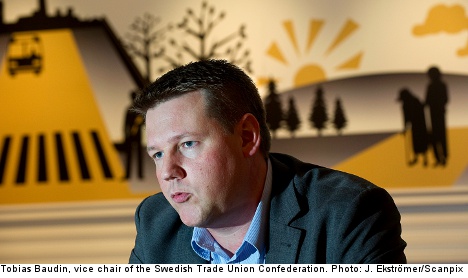“Working for the public good and limiting how much profit is taken out should be fundamental principles,” LO vice-chair Tobias Baudin and leaders in 14 of its member unions wrote in an op-ed published on Tuesday in the Dagens Nyheter (DN) newspaper.
In order to implement the profit cap, the authors suggest creating a new type of company which they dub samhällsbolag (‘community companies’).
The new companies would be based on a corporate structure that includes conditions closely tying profits to interest current rates.
Currently, there are about 50 such companies, referred to as SVB firms, an abbreviation stemming from särskild vinstutdelningsbegränsning (special profit limitations’), the Swedish term describing their built-in cap on profits.
In October, a parliamentary motion submitted by members of the Green Party also referenced SVB companies as a potential solution to the debate regarding profits in the welfare sector.
The union representatives also proposed a new council or state agency with the mandate to survey activities in the welfare sector.
“Tax money meant to finance the citizens’ schools, health care and social services are ending up in private pockets,” they wrote.
“Nowadays, it is completely permissible to allow private companies to make a profit at the expense of welfare quality.”
Creating a new type of company based on the SVB form proved unpopular with private welfare providers.
“There are two things in the LO proposal that both surprise and upset me. Firstly, the model they propose has already been tested but today there are no welfare providers run in that manner,” Håkan Tenelius at the Association of Private Care Providers (Vårdföretagarna), which represents employers, told the TT news agency.
“In practice, it is impossible to run a business in the long term with that type of model.”
He also thinks the profit-cap means tax payers will have to invest more than they do today as a reform would scare off potential investors.
“It would hamper new investments which are sorely needed. Who, apart from the tax payers, would want to pump in more cash to run a business that is so forcefully restricted?” Tenelius asked.
Political reactions to the proposal, which would reverse some aspect of the centre-right government health care and social services reforms, were mixed.
“It falls in line with what we have proposed,” noted Left Party leader Jonas Sjöstedt.
“Profit-seeking companies should not run welfare services.”
He classified the LO idea as more forceful than proposed reforms from the Social Democrats, who are the government’s main opposition in parliament and have historically been allied to the union movement.
New party leader Stefan Löfven’s refusal to tackle profits in the welfare sector head-on last year drew some internal criticism, partly from the party’s student wing who called it “naive”.
“It’s quite a big difference in that LO wants to remove the profit aspect, it’s a much sharper proposal than the one from the Social Democrats,” Left Party leader Sjöstedt told TT.
The LO proposal, however, immediately faced flack from business associations.
“It is highly regrettable that LO chooses a regulation line that gets in the way of business and risks leading to job losses,” Urban Bäckström, CEO of the Confederation of Swedish Enterprise (Svenskt Näringsliv), said in a statement.
It branded the LO proposal “an attack on business”.
“More than 10,0000 private companies and 100,000 employees could be affected be the proposals that LO have put forward.”
TT/The Local/at



 Please whitelist us to continue reading.
Please whitelist us to continue reading.
Member comments